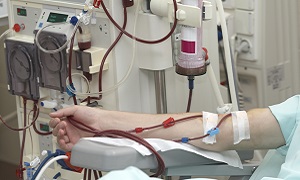Acute Kidney Failure
Acute kidney failure, which is also termed as acute renal failure, is a condition which occurs when your kidneys suddenly stop working. It can happen in just a few hours or days.
This condition is not always permanent, and your kidneys can return to normal function, if you receive immediate treatment right away, and if you are not having other serious health problems.
The main purpose of the kidneys is to filter out the waste from your blood. They also need to remove any extra fluid that is in your blood, which becomes your urine. Kidneys also help in making red blood cells as well as regulating electrolytes.
When kidneys are damaged, they are unable to work well. This could happen due to another health condition, such as diabetes. When there is a decrease in kidney function which happens over a longer period of time, it is known as chronic kidney failure.
Symptoms
You may not show any symptoms of acute kidney failure, and it might be discovered by your doctor during a lab test for another reason.
However, if you do show symptoms, then they are going to depend on how severe your condition is. Some of them might include:
- Urinating less than normal
- Itching
- Joint pain, swelling
- Swelling in your legs, ankles, and feet
- Feeling very tired or drowsy
- Throwing up or feeling like doing so
- Chest pain or pressure
- Confusion
- Shortness of breath
- Loss of appetite
- Muscle twitching
- Stomach and back pain
- Fever
- Seizures or coma (in severe cases)
- Rash
- Nosebleed
Causes
Acute kidney failure occurs when you have a condition which can slow the flow of blood to your kidneys, or if you experience any direct damage to the kidneys. In some cases, your kidney’s urine drainage tubes, i.e. ureters, can get blocked, due to which wastes might be unable to leave the body through your urine.
Certain conditions can slow blood flow to the kidneys, which can cause kidney injury. These include:
- Blood or fluid loss
- Heart disease
- Infection
- Liver failure
- Blood pressure medications
- Heart attack
- Use of medications such as aspirin or ibuprofen
- Severe allergic reaction
- Severe dehydration
- Severe burns
There are also diseases and conditions, which can damage the kidneys which can lead to acute kidney failure. They include:
- Blood clots in the veins and arteries in as well as around the kidneys
- Glomerulonephritis, which is an inflammation of the tiny filters of the kidneys
- Cholesterol deposits which can block blood flow in your kidneys
- Hemolytic uremic syndrome, a condition resulting from premature destruction of red blood cells
- Viral infection, such as with the virus that causes coronavirus disease 2019 or COVID-19
- Certain chemotherapy drugs, antibiotics, and dyes used during imaging tests
- Lupus, an immune system disorder that leads to glomerulonephritis
- Scleroderma, a group of rare diseases which can affect your skin and connective tissues
- Toxins, like alcohol, heavy metals or even cocaine
- Thrombotic thrombocytopenic purpura, which is a rare blood disorder
- Muscle tissue breakdown or rhabdomyolysis, that leads to kidney damage caused by toxins from the destruction
- Breakdown of tumor cells which can lead to the release of toxins, which can cause an injury in the kidney
Several diseases or conditions that can block the urine from passing out of the body may also cause acute kidney injury. They include:
- Bladder cancer
- Colon cancer
- Enlarged prostate
- Blood clots in the urinary tract
- Cervical cancer
- Kidney stones
- Nerve damage involving the nerves controlling the bladder
- Prostate cancer
Diagnosis
If your signs and symptoms are suggesting that you might have acute kidney failure, then your doctor might recommend certain tests and procedures in order to verify the diagnosis. These can include the following:
Urine output measurements
Blood tests
Urine tests
Imaging tests
Removing a sample of kidney tissue for testing

Treatment
Your treatment is going to depend on what your cause of acute kidney failure is. The goal of the treatment is to always restore the normal function of the kidneys. It is also important to prevent fluids and wastes from building up, during the recovery of the kidneys. In most cases, the evaluation is made by a kidney specialist known as a nephrologist.
Diet
Medications
Dialysis
Complications
Certain complications which can arise from acute kidney failure include:
- Chest Pain- If the lining covering your heart, i.e. pericardium becomes inflamed, you might experience chest pain.
- Fluid Buildup- Acute kidney failure might lead to a buildup of fluid in the lungs, which can cause shortness of breath.
- Muscle Weakness- Muscle weakness can be caused by your body’s fluid and electrolytes, and your body’s blood chemistry when they are all out of balance.
- Permanent Kidney Damage- Generally, acute kidney failure can lead to permanent loss of kidney function or even end-stage renal disease.
- Death- Acute kidney failure might also lead to loss of the function of your kidneys, and even death.
Prevention
Though it is generally hard to predict or prevent, taking a few steps can reduce your risk of developing acute kidney failure.
If you have kidney disease or any other condition, which can increase the risk of acute kidney failures, such as diabetes or high blood pressure, then follow your doctor’s recommendations to manage your condition.
Make a healthy lifestyle a priority. Make sure that you are active, and eat a sensible and balanced diet. If you drink alcohol, do it in moderation.







